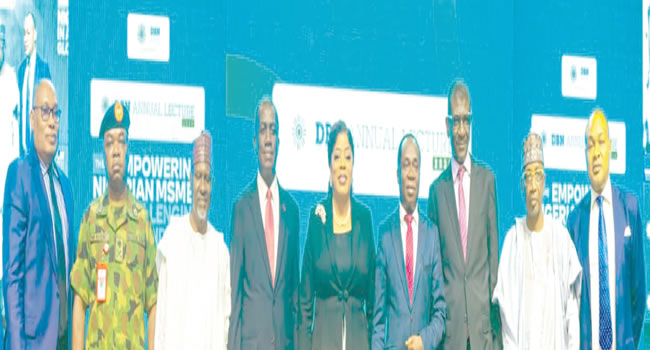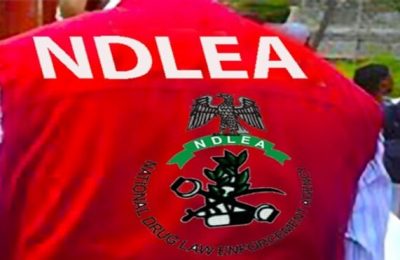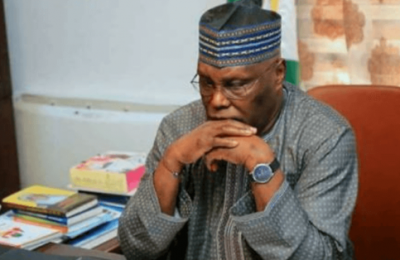
The Development Bank of Nigeria (DBN) recently held its fifth Annual Lecture in Abuja. CHIMA NWOKOJI analyses operational model of the institution, which is helping in unlocking potentials of Nigeria’s entrepreneurial class.
The Development Bank of Nigeria (DBN) has emerged as the unsung hero behind Nigeria’s entrepreneurial explosion, breathing life into the nation’s economic engine by empowering its most vibrant and resilient sector: Micro, Small, and Medium Enterprises (MSMEs).

At its fifth Annual Lecture in Abuja, DBN demonstrated why it is the cornerstone of Nigeria’s economic revolution, unlocking entrepreneurial potentials that are set to propel the nation into an era of unprecedented prosperity.
In his address, DBN’s Managing Director/CEO, Dr Tony Okpanachi, delivered a powerful call to action, rallying the government, financial institutions, and stakeholders to accelerate their efforts in removing the obstacles choking Nigeria’s MSMEs. His words echoed through the corridors of power—Nigeria’s entrepreneurs are the lifeblood of the economy, and it’s time to unleash their full potential!
DBN has channelled N787 billion to over 500,000 MSMEs. By its model, the institution has waged war on poverty, unemployment, and stagnation, empowering small businesses to create over 1.2 million jobs and foster growth in agriculture, technology, and manufacturing.
As Vice President, Senator Kashim Shettima, aptly noted, the impact of DBN is “far-reaching and transformative,” setting the pace for the nation’s future. Every loan granted by DBN is a building block for a stronger, more prosperous Nigeria.
It is a testament to the institution’s strategy that aligns seamlessly with President Bola Ahmed Tinubu’s administration’s key priorities—job creation, poverty eradication, and economic growth.
The DBN is not content with being a passive player in Nigeria’s economic story. It is rewriting the narrative, one MSME at a time. With its innovative financing, capacity-building programmes, and unyielding commitment to economic fairness, the bank is crafting a future where Nigerian entrepreneurs can dream big, think global, and conquer the world.
The bank’s ability to blend financial muscle with capacity-building makes it a powerhouse, ready to bulldoze through the challenges of inflation, unstable exchange rates, and global supply chain disruptions. Through its strategic interventions, DBN is lighting the path for MSMEs to flourish, ensuring that Nigeria doesn’t just survive the global economic storm, but thrives in it.
As industry leaders, government officials, and stakeholders gathered at the Annual Lecture, one thing was clear: Nigeria’s entrepreneurial potential is limitless, and DBN is one of the catalyst turning that potential into reality. The event wasn’t just a lecture; it was a rallying cry for all stakeholders to support the nation’s economic gladiators—its entrepreneurs.
In this challenging global landscape, the institution stands as a beacon of hope, signaling that with the right support, Nigerian MSMEs can lead the charge towards sustainable growth, job creation, and poverty reduction. The bank’s efforts have solidified its role as the guardian of Nigeria’s entrepreneurial future, proving that where there’s a will—and a DBN loan—there’s a way.
In Shettima’s goodwill message delivered by Dr Tope Fasua, Special Adviser to the President on Economic Affairs, he said the bank has played a transformative role in supporting the growth of MSMEs in Nigeria.
Shettima emphasized the “significant and far-reaching” impact the DBN has had on Nigeria’s real sector since its establishment in 2014.
The impacts resonate deeply with the current administration’s focus on key sectors, including agriculture, manufacturing, and technology. By directing substantial funding to these areas, the development Bank has not only supported the growth of individual enterprises but has also had a systemic impact on key sectors of the Nigerian economy.
The theme of the Annual Lecture, “Empowering Nigerian MSMEs in a Challenging Global Landscape,” according to the organisers reflects the daunting obstacles facing MSMEs today.
As the Special Guest of Honour, Shettima stated that the DBN’s provision of over N787 billion in loans to more than 500,000 MSMEs across Nigeria has substantially bolstered job creation, boosted economic activity, and contributed to poverty reduction.
Alignment with FG’s policies
These achievements align with the key pillars of President Bola Ahmed Tinubu’s administration.
The DBN operates by providing financing and partial credit guarantees to eligible financial institutions, which then on-lend to MSMEs. This model according to the Vice President, contributes to the administration’s broader agenda of fostering inclusivity, economic fairness, and sustainable growth.
By providing financial access to this underserved segment, DBN has been able to catalyze growth and contribute to national development goals, particularly in terms of job creation and poverty alleviation he stated.
The Vice President’s message did not just highlight DBN’s achievements but also outlined some of the administration’s broader efforts in supporting MSMEs. Among these initiatives are the signing of two Foreign Direct Investment (FDI) deals worth over half a billion dollars, the launch of the Compressed Natural Gas (CNG) initiative, and the distribution of one million conversion kits to commercial vehicles.
These actions are designed to modernize key sectors and reduce operational costs for MSMEs.
Other significant interventions include the creation of a Consumer Credit Corporation, backed by N200 billion, to enhance access to credit for businesses and individuals, as well as the $620 million Digital and Creative Enterprises (IDiCE) programme. This initiative is particularly aimed at supporting startups and young entrepreneurs in the digital and creative sectors, areas that have shown tremendous growth potential in recent years.
Additionally, the administration has introduced the Skill-Up Artisans Programme (SUPA), the Nigerian Youth Academy (NIYA), and the National Youth Talent Export Programme (NATEP) as part of a broader strategy to equip Nigeria’s workforce with the skills needed for a modern economy.
Perhaps one of the most impactful interventions has been the signing of the new National Minimum Wage law, which raised the minimum wage to N70,000 per month. This increase is intended to boost the purchasing power of workers and stimulate domestic demand, which in turn benefits small businesses that rely on local consumption.
Importance and challenges
The keynote address was delivered by Dr Nneka Onyeali-Ikpe, Group Managing Director/CEO of Fidelity Bank Plc, who elaborated on the opportunities and challenges facing MSMEs.
The significance of MSMEs to Nigeria’s economy cannot be overstated. Representing the backbone of economic activity, MSMEs account for a substantial portion of employment and output in the country. They drive innovation, create jobs, and contribute to poverty reduction.
Yet, they face numerous challenges which threaten their survival, particularly in the current global economic climate, which has been marked by rising production costs, inflation, volatile exchange rates, and disruptions in global supply chains.
The global economic environment is fraught with uncertainties that have made it increasingly difficult for small businesses to thrive.
Rising production costs, inflation, unstable exchange rates, and disruptions in the global supply chain are just a few of the challenges that Nigerian MSMEs face. For businesses that are heavily dependent on imports, fluctuations in currency exchange rates can severely affect profitability, while inflation eats away at their purchasing power.
Access to affordable finance remains one of the most significant hurdles for MSMEs. Traditional lending models often exclude small businesses due to stringent requirements and high interest rates. This financial exclusion limits the ability of small enterprises to scale up, innovate, or even maintain operations. Without access to adequate working capital, many businesses are forced to operate at reduced capacity or shut down entirely.
Disruptions in the global supply chain have also had a profound impact on MSMEs. Delays in the availability of raw materials and finished goods, coupled with price fluctuations, have affected the ability of small businesses to meet demand and maintain profitability. Many MSMEs lack the financial cushion to absorb these shocks, making them particularly vulnerable to global disruptions.
Dr Nneka Onyeali-Ikpe, outlined several strategies for empowering MSMEs in the face of these challenges. She stressed the need for innovative financial solutions tailored to the unique needs of small businesses, including loan guarantee schemes that reduce the risk for lenders and encourage them to offer more competitive loan rates to MSMEs. Onyeali-Ikpe also called for targeted tax breaks and deductions that incentivise investment and reinvestment of profits within the MSME sector.
One of the most significant areas of concern for MSMEs is the lack of infrastructure. Without reliable energy grids, transportation networks and communication systems, the operational costs for MSMEs skyrocket, making it difficult for them to remain competitive. Onyeali-Ikpe emphasised the need for public and private investment in infrastructure, which would reduce operational costs and improve the ease of doing business in Nigeria.
Another critical area is innovation and technology. MSMEs must embrace digital transformation to remain competitive in today’s global market. Whether it’s adopting e-commerce platforms to reach a broader customer base or using digital tools to streamline operations, technology offers significant opportunities for MSMEs to enhance their productivity and profitability.
DBN’s further commitment
The DBN has shown unwavering commitment to supporting the sector through its financing initiatives and capacity-building programmes. Since the inception of its Annual Lecture Series in 2019, the DBN has used the platform to stimulate dialogue among key stakeholders and develop actionable solutions to the challenges faced by MSMEs. This year’s lecture was no different, bringing together top industry leaders, policymakers, and financial experts to explore ways to empower MSMEs in the face of global challenges.
As Dr. Tony Okpanachi noted, the DBN’s efforts have not gone unnoticed. The bank has cumulatively disbursed N786 billion in loans to nearly 500,000 MSMEs, resulting in the creation of over 1.2 million jobs. These efforts are a testament to the bank’s commitment to driving sustainable economic growth in Nigeria. By focusing on critical sectors like manufacturing and agriculture, the DBN has not only provided financial support but also strengthened the industries that are key to Nigeria’s economic future.
In addition to financing, the DBN has been instrumental in capacity building. Through its partnership with financial intermediaries, the DBN provides technical assistance and training programs that help MSMEs build the skills they need to succeed. This focus on human capital development is crucial in ensuring that small businesses have the managerial, financial, and operational expertise necessary to thrive.
Stakeholders at various levels are unanimous in their views that these efforts have had significant impacts on Nigeria’s economy and entrepreneurial ecosystem.
DBN’s financing has improved living standards; expanded access to financial services; its training programs have enhanced entrepreneurial capacity, boosted agricultural productivity. It has supported growth in the manufacturing sector and financed renewable energy projects.
Its operational Impacts included robust risk management framework, streamlined loan processing and disbursement; collaborations with private sector, Non- Governmental Organizations (NGOs), and government agencies, sustainable economic growth, increased competitiveness and improved business environment.
A call to action for stakeholders
The DBN Annual Lecture serves as a clarion call for all stakeholders to rally behind Nigeria’s MSMEs. The success of MSMEs according to Opkanachi is not just a goal but a necessity for the prosperity and sustainability of the nation. By working together, the government, financial institutions, and other stakeholders can create a more conducive environment for small businesses to overcome the challenges they face.
Furthermore, simplifying trade regulations and procedures would enable easier access to regional and international markets, providing MSMEs with new growth opportunities.
A panel discussion capped the discourse, featuring industry leaders such as Abba Abubakar Aliyu, Managing Director/CEO of the Rural Electrification Agency (REA); Ajuma Ataguba, Managing Director of the Founder Institute and Venture Partner at White Hibiscus Capital; Joshua Oluwatobi Ajayi, Chairman/CEO of Nord Automobiles Limited; and Nkemdilim Uwaje Begho, CEO of Futuresoft. The panelists discussed a wide range of topics and sub-topics, including access to finance, innovation, and strategies to mitigate the impact of global economic challenges on Nigerian MSMEs.
The Annual Lecture according to some participants underscores the critical role that MSMEs play in Nigeria’s economy and the importance of empowering them to thrive in a challenging global landscape. With the right policies, financial support, and infrastructure in place, MSMEs can unlock their full potential and contribute to sustainable economic growth in Nigeria. As stakeholders continue to work together, there is hope that MSMEs will not only survive but thrive, driving innovation and job creation.
READ ALSO: Lagos: Train crushes man to death in Oshodi







